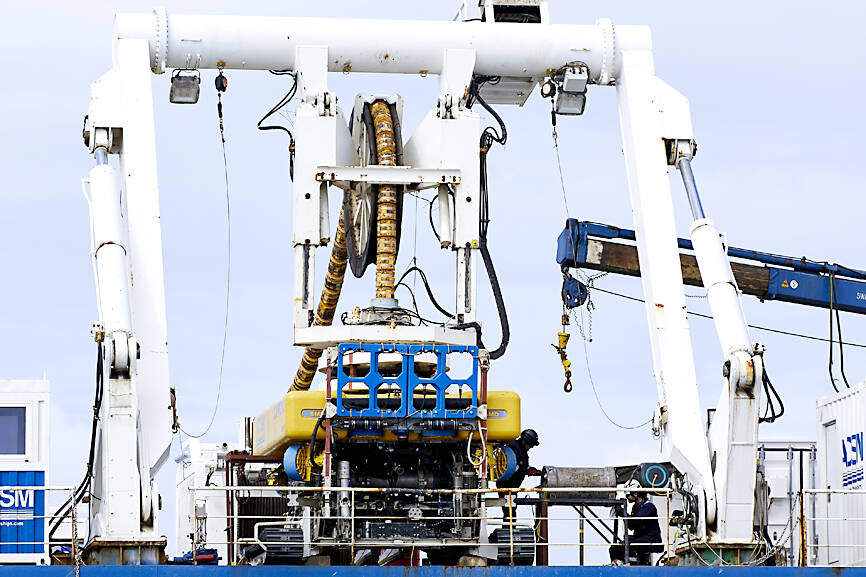The US Federal Communications Commission (FCC) voted unanimously on Thursday to launch a “major, comprehensive review” and update of rules governing submarine cables amid an increase in potential state-sponsored attacks on critical infrastructure.
FCC Chair Jessica Rosenworcel said the review of the systems responsible for facilitating the flow of global Internet traffic is long overdue.
The agency previously granted cable landing licenses for 25 years “without requiring any update about who owns and controls the facility.”

Photo: AP / Craig Mitchelldyer
The last review was in 2001, and the technology, economics and national security environment surrounding the systems have changed tremendously since then, the FCC said.
There are 84 FCC-licensed cable systems.
“That is a quarter of a century during which information about foreign investment and interconnection essential for the secure flow of data traffic is not updated. That is too long,” Rosenworcel said.
There have been several high-profile instances of subsea cable disruptions recently, including Taiwan’s accusation that two Chinese vessels severed cables providing Internet access to Lienchiang County.
Earlier this year, three cables serving Europe and Asia were severed amid Houthi attacks in the Red Sea, and Baltic Sea cables serving Germany, Sweden, Estonia, Lithuania and Finland also experienced tampering multiple times, including as recently as this week.
“While the details of these incidents remain in dispute, what is clear is that these facilities — with locations that are openly published to prevent damage — are becoming a target,” Rosenworcel said. “Add to this vulnerabilities that come from trawling anchors, aquatic life, and climate disturbances and it is clear we need to do more to protect these facilities.”
The FCC said it is specifically seeking public comment on how it could make its subsea cable rules more efficient while ensuring the security of critical infrastructure.
It proposes that subsea cable operators check in with the commission every three years and is considering whether the 25-year license term should be shortened.
The agency is debating whether it should collect more information on the companies seeking subsea cable licenses, including taking a closer look at their “ownership, control and use of a subsea cable system.”

The US dollar was trading at NT$29.7 at 10am today on the Taipei Foreign Exchange, as the New Taiwan dollar gained NT$1.364 from the previous close last week. The NT dollar continued to rise today, after surging 3.07 percent on Friday. After opening at NT$30.91, the NT dollar gained more than NT$1 in just 15 minutes, briefly passing the NT$30 mark. Before the US Department of the Treasury's semi-annual currency report came out, expectations that the NT dollar would keep rising were already building. The NT dollar on Friday closed at NT$31.064, up by NT$0.953 — a 3.07 percent single-day gain. Today,

‘SHORT TERM’: The local currency would likely remain strong in the near term, driven by anticipated US trade pressure, capital inflows and expectations of a US Fed rate cut The US dollar is expected to fall below NT$30 in the near term, as traders anticipate increased pressure from Washington for Taiwan to allow the New Taiwan dollar to appreciate, Cathay United Bank (國泰世華銀行) chief economist Lin Chi-chao (林啟超) said. Following a sharp drop in the greenback against the NT dollar on Friday, Lin told the Central News Agency that the local currency is likely to remain strong in the short term, driven in part by market psychology surrounding anticipated US policy pressure. On Friday, the US dollar fell NT$0.953, or 3.07 percent, closing at NT$31.064 — its lowest level since Jan.

The New Taiwan dollar and Taiwanese stocks surged on signs that trade tensions between the world’s top two economies might start easing and as US tech earnings boosted the outlook of the nation’s semiconductor exports. The NT dollar strengthened as much as 3.8 percent versus the US dollar to 30.815, the biggest intraday gain since January 2011, closing at NT$31.064. The benchmark TAIEX jumped 2.73 percent to outperform the region’s equity gauges. Outlook for global trade improved after China said it is assessing possible trade talks with the US, providing a boost for the nation’s currency and shares. As the NT dollar

The Financial Supervisory Commission (FSC) yesterday met with some of the nation’s largest insurance companies as a skyrocketing New Taiwan dollar piles pressure on their hundreds of billions of dollars in US bond investments. The commission has asked some life insurance firms, among the biggest Asian holders of US debt, to discuss how the rapidly strengthening NT dollar has impacted their operations, people familiar with the matter said. The meeting took place as the NT dollar jumped as much as 5 percent yesterday, its biggest intraday gain in more than three decades. The local currency surged as exporters rushed to